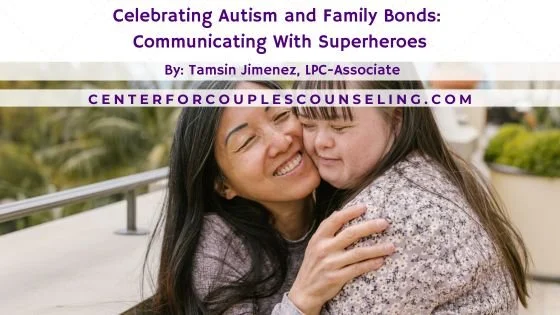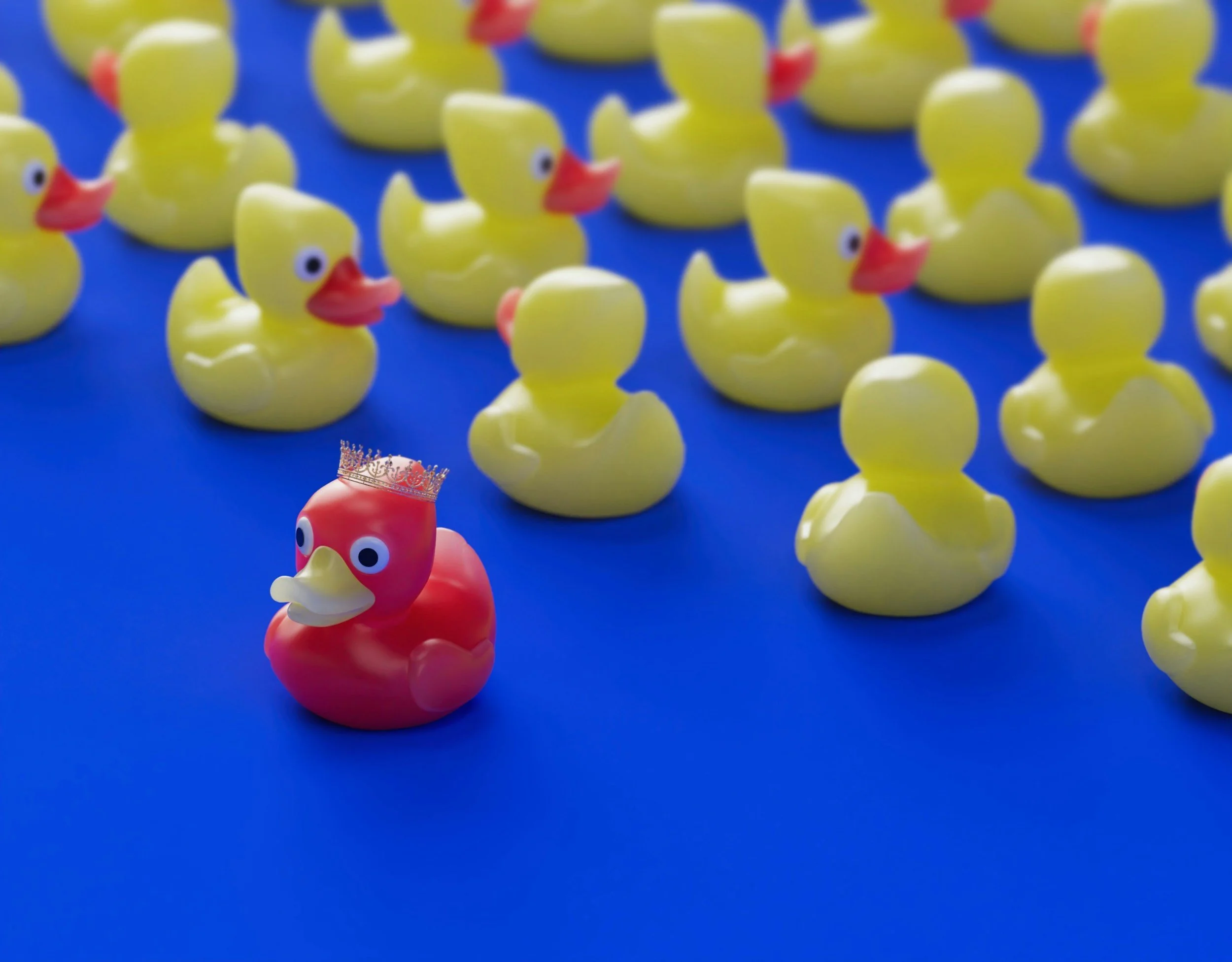Celebrating Autism and Family Bonds: Communicating With Superheroes
Shape-Shifting the Narrative
Is it just me, or does way too much of the language we use to define neurodiverse children feel negative and marginalizing? Parenting is a deeply personal journey filled with joys and challenges. When raising a neurodiverse child, these opportunities can take on unique forms. A few years ago, I noticed my nephew struggling with some unique behaviors. Being somewhat of a linguistics nerd myself, the value of intentional communication is not lost on me. It wasn’t long before “unique behaviors” morphed into “super powers.” We all have them, but when we hone in on these powers from a lens of cognition and all its fantastically varied functionality, understanding how our loved one can best fit their capes requires creative vision.
When I think of superheroes in a relational context of appreciating the dynamic quest of caregiving on the autism spectrum, I envisage vibrant personas battling “should” culture and grappling their way to radical acceptance…
BAM! POW! WOW!
As a proud “Aunt-Mom,” I delight in the opportunity to watch this brilliant boy navigate his seat on the spectrum with the same precision and expertise he asserts when he’s earned himself some Fortnite V-bucks. What he lacks in social cues and filters (hey buddy, I see you NOT dropping f bombs at the 5-year old’s birthday party, and I’m proud of you!), he more than makes up for in unapologetically living his authentic life. Whether we’re ready or not (spoiler alert: I’m not), puberty is around the corner (insert my own f bomb). What I so deeply want for him is a welcoming team. A team who, like me, recognizes (1) he’s cooler than I could ever aspire to be, (2) he is one of the most engaging and curious humans I’ve ever met, and (3) because watching him refine his super powers and figure out where he feels safe, and more importantly unsafe, is by far one of the best gifts I’ve ever received.
Are We Even Speaking the Same Language?
As a mental health professional, I’ve seen that one of the most effective ways parents can support their children is to meet them where they are, rather than pushing them to communicate in ways that might feel foreign or uncomfortable. This might look like offering alternative communication methods, such as artistic expression, sign language, or technology-assisted communication (the preferred method for my superhero). As the student becomes the master, a fundamental element is to remain patient and persistent.
Active listening is also crucial. A common superhero trait manifests itself in the strong and silent persona. NOT to be confused with overt defiance. When feels are big, communication is limited. Is anyone immune to this? Listening to truly comprehend can be easier said than done, and superheroes oftentimes communicate in unconventional ways. Purposefully adjusting the frequency on our grownup ears can allow us to uncover the meaning behind behaviors, body language, and silence. When we understand the “why?” behind the communication and learn to interpret these cues, we can respond with empathy and understanding.
Superheroes. NOT To Be Confused With Aliens!
Through one lens, what’s different can appear frightfully foreign. Through another, our view shifts to insight and opportunity. One of the most powerful tools we can adopt is a neurodiversity-affirming perspective. This means setting our optics to approaching autism not as something that needs to be "fixed" but as an extraordinary and valuable way of experiencing the world. When we embrace a child’s neurodivergent traits as super powers, what once felt like unchartered territories, transform into environments of acceptance and love.
Understanding Autism Development & Accommodations
Does your superhero accessorize their costume with a mask, glasses, gauntlets, or gloves? It’s essential to recognize that what may seem like a difficulty or delay in typical development is often just a different trajectory. You have your cape, and I have mine. Autistic children might experience sensory processing differently, have heightened sensitivities, or thrive within different structures and routines. Rather than viewing these traits as obstacles, we can see them as opportunities to build a more supportive environment.
If your superhero struggles with change (WHO MOVED MY CAPE?!), instead of trying to force adaptability, create predictability and clear transitions. That cape needed to visit the crew laundry like 10 missions ago. To maintain optimal performance, let’s schedule cape cleaning every week. If sensory overload threatens their course, try curating sensory-friendly spaces and experiences. These shifts in perspective help reduce frustration and increase understanding for all team members.
Supporting Unique Social Learning
Some of the most beloved superheroes operate solo. Others flourish on a team. Autism affects socialization and child development in profound ways, particularly when it comes to interpreting social cues and forming relationships. Autistic children may have difficulty understanding non-verbal cues, such as facial expressions or tone of voice, which can lead to misunderstandings or feelings of social isolation.
One way to support social development is through intentional social skills training. Therapists often employ role-playing exercises or group activities designed to practice understanding facial expressions, body language, and social reciprocity. We can reinforce these skills at home by modeling empathetic communication and providing clear, concrete explanations of social situations.
Additionally, and this is incredibly important, recognizing the importance of special interests—areas of intense focus that many autistic children develop—can be a literal game-changer for socialization. By encouraging these interests and using them as entry points for social interaction, we can help our children connect with others in a way that feels natural and enjoyable for them.
Normalizing to Cultivate Connection
Let your superhero shine!
In monochromatic, matte, black, or technicolor rainbow. Sparkle, baby! As we continue to learn how to decipher the superhero code, it’s critical for us to let go of the need to fit our children into neurotypical molds. Why not celebrate the multitude of unique ways they experience the world? Umm, have you ever tried to squash into an ill-fitting, spandex, onesie? Awkward. And painful.
There is no one-size-fits-all approach to superhero rearing, and our strategies should reflect this diversity. I mean, one of the best bits of superhero life is in harnessing the inimitable. With love, acceptance, and the right tools, we can not only support development but also build a deep and lasting bond that transcends differences.
What’s on Your Toolbelt?
Thankfully, there is a wealth of research and resources we have access to when we start the awkward training montage as neurodivergent caregivers. To all you nomenclature novices out there, my personal recipe for ever-evolving mastery in this realm is being equal parts present and patient plus a few of my go-to books on the subject.
John Elder Robison’s memoir, “Look Me in the Eye: My Life with Asperger’s” sits next to his younger brother, Augusten Burroughs’s, page-turner, “Running with Scissors.” Both boast barely attached pages and stressed spines, worn with my continuous quest for guidance. For me, the personal insights add poignant layers of self-reflection that feel more relatable and applicable than their instructional forward counterparts. Not without credit; however, Dr. Daniel Siegel’s pragmatic presentation, “The Whole-Brain Child,” likewise earns top billing in its exploration of the developing child mind.
Couple’s Therapy Provides Essential Tools for Superhero Caregivers
While supporting a neurodiverse child is rewarding, the reality of it is, it can also place significant emotional and logistical stress on a relationship. And that’s OK! Raising superheroes is tough work. Give yourself permission to be human. Parenting a child on the spectrum often involves additional layers of planning for managing frustrations and advocating for support systems. This labyrinth can understandably make it difficult for couples to maintain connection and cohesiveness.
This is where couples therapy becomes an invaluable resource. Seeking professional support can help partners navigate the unique challenges of parenting together to ensure that your relationship remains strong and resilient. Interstellar aircrafts carry only a select few crew members who absolutely must work together, and they sit next to each other, at the helm. Here’s how couples therapy can benefit you:
Enhanced Communication: Couples therapy provides a safe space to openly discuss the emotional and practical difficulties that arise while parenting a neurodiverse child. The right therapist can guide you in developing healthier communication patterns, which are essential when stress levels are high.
Strengthened Partnership: It’s easy for one parent to take on the role of primary caregiver, leading to feelings of imbalance or resentment. Couples therapy can help you realign your roles and responsibilities, allowing both parents to feel supported and empowered.
Emotional Resilience: Parenting is emotionally taxing. Especially when it involves advocating for your child’s unique needs. Therapy can equip couples with tools to process these challenges together, fostering emotional resilience as a team.
Unified Parenting Strategies: Parenting a neurodiverse child often requires consistent approaches to routines, communication, and discipline. Stay the course! Couples therapy can help partners to develop a unified parenting plan that accounts for your child’s specific needs while strengthening your bond.
If you’re ready to strengthen your partnership while navigating the unique challenges of raising a superhero, beam yourselves up, and consider seeking couple’s therapy. Begin the work together, to create and maintain a balanced and loving environment where your entire superhero tribe can thrive.
Hey there! I’m Tamsin, and I am a Licensed Professional Counselor Associate located in League City, Tx. I am an LBGTQ+ affirming counselor, specializing in helping people see their relationship in a new way so they can change their behavior. I believe we can all have the relationship we really want by challenging our mindsets and learning to grow together. If you're seeking a therapist who will sit with you as we explore all the pieces of your relational puzzle in a non-judgmental way, please call (832) 827-3288. Our Center serves couples and individuals in League City and Houston, Texas and all residents of Texas online!
Interested in Meeting a Couples Therapist in League City, TX?
If you want to improve your relationship and reconnect with your partner, take action now and start being more curious about your relationship. At Center For Couples Counseling, one of our skilled couples therapists can help you and your partner navigate your challenges and rediscover the curiosity and passion that brought you together in the first place. Don't wait any longer to invest in the health and happiness of your relationship. To meet with a couples therapist follow these three simple steps:
Contact us to schedule an appointment
Meet with one of our skilled couples therapists
Begin to find the curiosity in your relationship and reconnect with your partner!
Other Services Offered at Center for Couples Counseling
At Center For Couples Counseling, our team of skilled therapists understands that your relationship may be facing different challenges. In addition to couples therapy, our Texas practice offers individual therapy, infertility counseling, postpartum anxiety and depression counseling, therapy for self-care and burnout, and therapy for perfectionism. For more about us check out our FAQs and blog!









